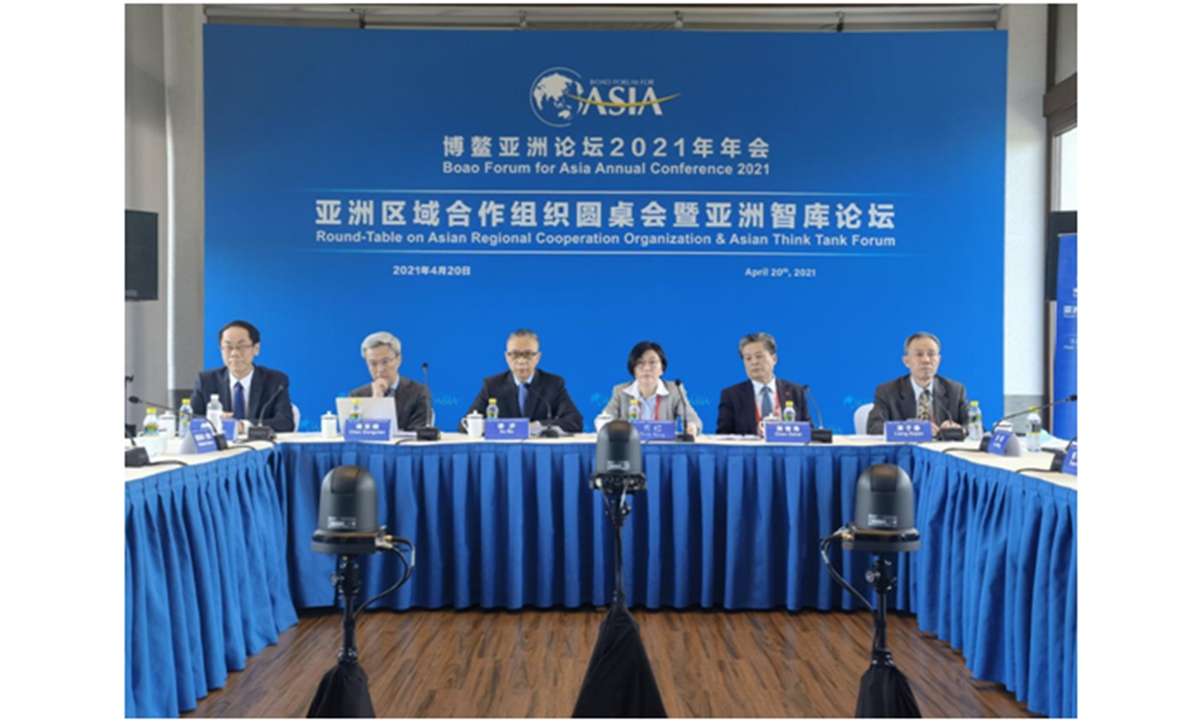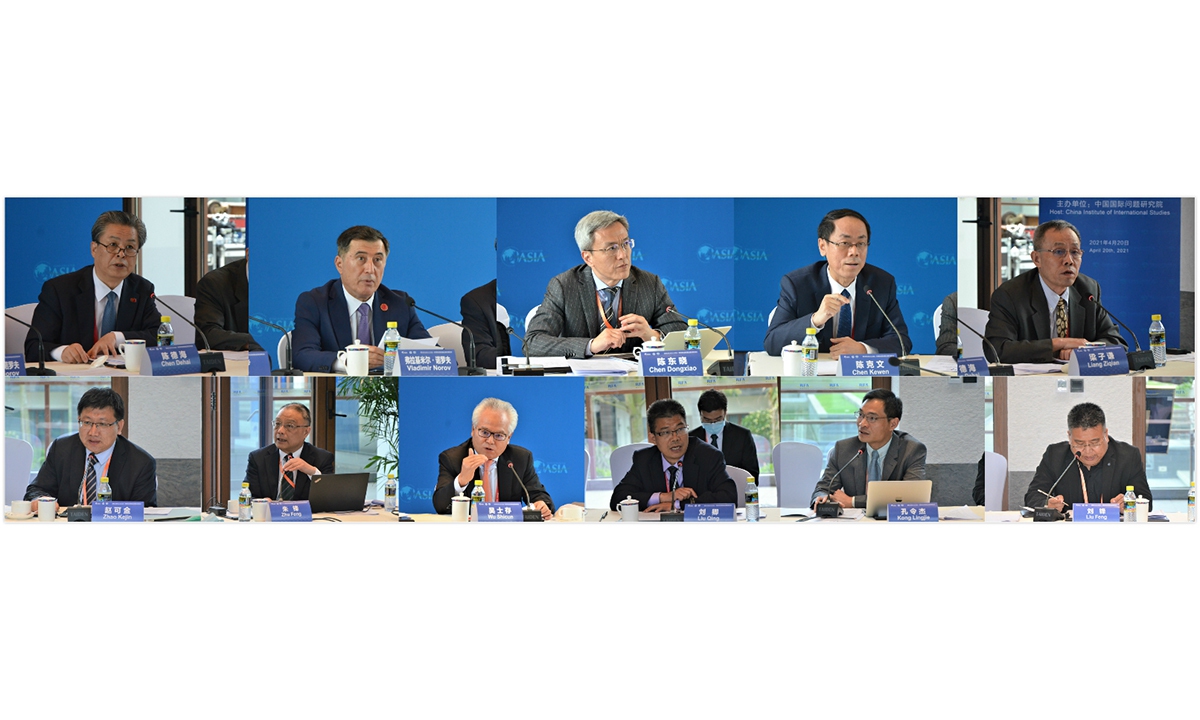
Delegates speak at the round-table talks in Hainan Province on Tuesday Photo: Courtesy of CIIS
Global governance is in definite need of Asia's wisdom and solutions in the post-COVID-19 era, which calls for regional cooperation and multilateralism, said scholars and experts at a round-table on the sideline of the 2021 Boao Forum for Asia (BFA) in south China's Hainan Province on Tuesday.
Hosted by the China Institute of International Studies (CIIS), the round-table attracted more than 40 experts and high-level delegates from institutes and peer think tanks based in Asia. Scholars find it important to foster multilateralism, enhance cooperation, and improve cybersecurity in the post-COVID-19 era.
Regional cooperation in Asia is facing a new situation from major changes unprecedented in a century, said Xu Bu, president of CIIS, in his opening remarks. "We must stand firm in Asia, and continue to promote regional cooperation in Asia to achieve new and greater development," he said.
Xu recommended that Asian countries need to firmly defend multilateralism and maintain an Asian regional cooperation mechanism that is in line with Asian characteristics.
He also said that Asia needs to practice the concept of community with a shared future in the Asia-Pacific, cultivate a culture of Asian cooperation in the new era, and consolidate the core value concept of "people come first."
Fang Hong, deputy director-general in the Department of Asian Affairs under the Chinese Foreign Ministry, said Asian countries as a whole will need to lead the trend of regional development that advances with the times, build a green and harmonious regional symbiosis, and form an open and inclusive relationship. She said that the Chinese President Xi Jinping's speech at BFA provides important guidance for China's participation in regional cooperation in Asia, and injects impetus and confidence in the bright future of the region and the world.
Chen Dongxiao, president of the Shanghai Institutes for International Studies, said that multilateralism is important for regional cooperation to achieve development. When the supply chain gets more fragmented, too many transnational factors impact cooperation. Therefore, multilateralism needs to play its central role to make sure that regional development is inclusive.

Delegates speak at the round-table talks in Hainan Province on Tuesday Photo: Courtesy of CIIS
The Shanghai Cooperation Organisation (SCO) Secretary-General, Vladimir Norov, said that Asia is our common home, where the historical fates of peoples and states are intertwined.
"It is obvious that against the backdrop of global challenges and threats, Asia is demonstrating confident economic and spiritual growth, and the desire for joint sustainable and inclusive development," Norov said.
The year 2021 marks the 20th anniversary of SCO's establishment, and the organization is preparing to solemnly celebrate, said Norov.
"Preparations are in full swing for the SCO summit this year to be held in September in Dushanbe, the capital of the Republic of Tajikistan," he said.
Acute pandemic problems, poverty, unemployment, international terrorism, drug trafficking, and cross-border crime continue to be a common concern. Cybersecurity issues are becoming more acute, and the threat of possible bioterrorism is growing, Norov pointed out.
"We firmly believe that by strengthening friendship and good neighborliness, by adhering strictly to the 'Shanghai spirit,' the SCO will not only reach qualitatively new frontiers of cooperation, but will also significantly increase its contribution to regional security and stability, actively promote economic prosperity and integration processes, and solve the global problems of today," he stressed.
Rethy Chhem, executive director of the Cambodia Development Resource Institute, a leading think tank in Cambodia and the Association of Southeast Asian Nations (ASEAN) region, suggested that more support needs to be offered to poor states, reaffirming our solidarity to control and contain the pandemic.
ASEAN Secretary-General, Lim Jock Hoi, said that the achievements of the 30th anniversary of the establishment of China-ASEAN dialogue relations are remarkable. Both sides should leverage this as an opportunity to strengthen cooperation and further promote regional cooperation in Asia and global governance.
Chen Dehai, Secretary-General of the ASEAN-China Centre, said that China and ASEAN should be committed to further strengthening people-to-people and cultural exchanges and build a solid foundation for the in-depth development of bilateral relations in various fields.
Scholars agreed that in the spirit of solidarity, Asian countries need to continue to promote vaccine and digital economic cooperation, adhere to true multilateralism, and solidly promote the process of Asian regional cooperation in the regional economic and social recovery.
Meanwhile, Moin ul Haque, the Pakistani Ambassador to China, said that a prosperous future for humanity in today's world could only be built through dialogue, solidarity, and mutually beneficial cooperation.
He also noted that China's proposed Belt and Road Initiative offers a new model of a win-win collaboration, partnership, and connectivity in a world of increasing geopolitical uncertainty and rising inequalities both within and among the nations. "Pakistan is a proud partner of BRI through its flagship program of the China-Pakistan Economic Corridor, which capitalizes on Pakistan's ideal location at the crossroads of regional markets and the government's policy of geo-economics to act as a transit corridor for trade, energy pipelines, and tourist flow," he said.





